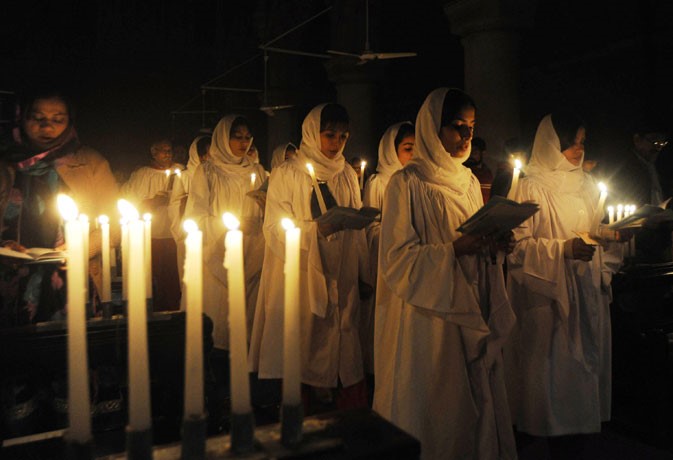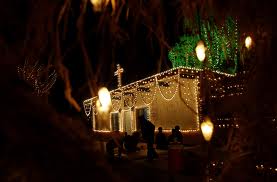Celebrating Christmas in Pakistan
The month of December brings joyful tidings across the world as more than two billion people anticipate celebrating the birth of Christ on December 25 although the Orthodox churches celebrate 12 days later.
Each culture celebrates this day according to its customs, and each calls the day by different names. In Pakistan, most people call it Barra Din (Urdu) and Wadda Din (Punjabi), meaning “The Big Day”—a name introduced by Imam Din Shahbaz who translated the book of Psalms into Punjabi lyrical poetry. In Bangladesh, people call it Shubh Borrodin, and in Nepal it is Badda Dinko Shuvkamnaa. In Arabic, Christmas is named Eid-e-Milad al Masih (Happy Birthday of Messiah).
A Dual Holiday on December 25
Christmas is celebrated freely in Pakistan the 25th of December is a government holiday; this date is also the birthday of the founder of Pakistan, Muhammad Ali Jinnah (1876-1948). The national holiday gives Christians in this majority Muslim country an opportunity also to celebrate the birth of Christ.
Christmas is a fun holiday. Everybody has a good time singing Christmas carols and watching amazing performances of the Christmas story that the kids perform for their families or in church. If possible, Pakistani Christians who live and work in foreign countries come back to celebrate this day with their families.
Cultural Christmas Traditions
Preparation begins during the first week of December. People may paint their whole house, purchase new furniture, and almost every Christian family tries to buy a Christmas tree and decorate it in their home. Most often engagement and wedding ceremonies are also arranged in December. Poor families wait for the whole year to get new clothes and shoes for their children. Everyone in the family asks their parents or elders to visit them as well as their relatives in various places.

Also in the first week of December, some churches organize special “White Gift” services for women, who wear white dresses in honor of Mary as the mother of Jesus. In these services the church gives gifts to their women members. Many Christians distribute food baskets and money to poor and needy widows, children and poor families.
Another strong cultural tradition is for parents to send gifts and sweets to married daughters before Christmas. Since the married daughters usually live close to, and perhaps even with her husband’s parents, the daughters wait with high expectation for her family to bring a Christmas gift to her in her in-laws house. It is considered a sign of love and care and also honors the daughter.

Young girls apply artistic henna decorations on their hands and wear bangles on their arms with new clothes. Young boys and church members decorate the outside of their houses in a kind of street art to tell the story of Jesus birth. Sometimes a competition to decorate mangers is organized by local churches on street corners in Christian communities. Every church building is decorated with lights and a big star on the top. Families may also place paper stars in their windows at home. Christmas carols and song competitions are arranged by different churches. Christmas dinners are prepared, Sunday schools organize special programs and dramas to remember the Christmas story.
On Christmas Eve, everyone at home keeps their eyes on their clocks, waiting for all three arms to converge exactly at midnight. What a joyful moment when everyone greats each other with "MERRY CHRISTMAS TO YOU! HAPPY CHRISTMAS! BARRA DIN MUBARAK! WADDA DIN MUBARRAK!" Elders give blessings to their children for long life, peace, love and unity, while young ones hug each other. On the streets, youth with their elders ignite fireworks, another symbol of joy and happiness for this great day.
Christmas Worship Services
In addition to celebrations at home, those who can attend church also gather on Christmas Eve, and the majority of communities try to attend a midnight service. Some mainstream churches follow a traditional liturgy. Small churches in villages and countryside include scripture, prayer, and especially singing psalms and carols by intergenerational family groups. People coming back from the midnight service greet other walkers and whoever comes their way. Some families visit each other even after the midnight service. The joyful spirit of this day is more delightful than any other holiday. Many people stay awake all night and then attend Christmas morning worship. On December 25 everyone tries to attend worship.
After the service people visit relatives, prepare special food and share the joy of visiting family and friends. Many families, especially those from suburban or slum areas, like to visit recreational places such as the zoo, park or seaside with friends and families.
Peace Building at Christmas
When Jesus was born, the angels sang of peace on earth. In Pakistan, Christmas season is an opportunity of Christians to share the peace of Christ with their Muslim neighbors. Christians share cakes and sweets and exchange gifts as well with their Muslim friends. Churches and Christian organizations arrange special Christmas dinners and invite government officials. Almost all mainstream Muslim political parties try to send delegates with cakes to offer Christmas greetings before or during Christmas services. The midnight Christmas Eve service thus has become an opportunity for efforts toward building peace and harmony between Muslims and Christians.
God is God! God became incarnate in Jesus Christ to show that every human being is loved by God. He was born in Bethlehem to show that every piece of land is God's footstool. And he was born in time to show that in every age, we can celebrate his birth. God proved his love to the world by becoming human, by choosing a particular geographical place and time in history to announce good news to the whole world. We can share his story with each generation in every place, also in Pakistan.
Barra Din Mubarak to all of you!